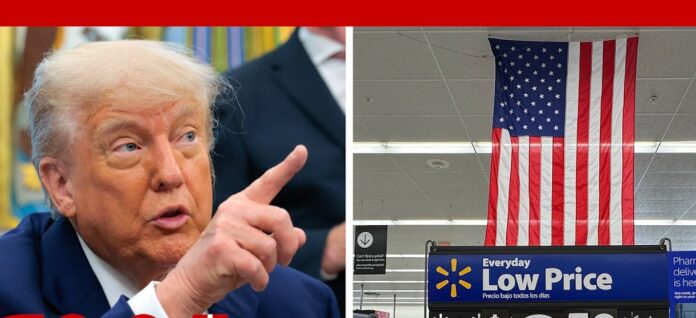U.S. treasury claims Walmart folded after Trump tirade, vows to absorb tariff shockwaves.
Walmart, the United States’ largest retailer, has been forced into damage control after Donald Trump launched a blistering attack over its plan to raise prices due to his sweeping new tariffs. According to US treasury secretary Scott Bessent, the retail giant has now agreed to “eat some of the tariffs” following direct pressure from the president.
In a startling admission on NBC’s Meet the Press, Bessent claimed he spoke personally with Walmart CEO Doug McMillon and was assured the company would comply with Trump’s demands. “Walmart is, in fact, going to, as you describe it, eat some of the tariffs, just as they did in ‘18, ‘19, and ‘20,” Bessent told host Kristen Welker. He insisted the retailer would hold down prices, even if it meant tighter margins.
Trump’s fury had erupted a day earlier, when he took to Truth Social to lambast Walmart’s announcement that it would raise prices starting later this month. The company had blamed Trump’s punishing new tariffs, saying they were impossible to absorb.
“Eat the tariffs and don’t charge valued customers anything,” the president barked in all-caps, triggering panic at corporate headquarters.
Yet Walmart has not officially confirmed Bessent’s version of events. A spokesperson declined to comment on “private conversations between executives and administration officials.” However, a source close to the matter said the call between Bessent and McMillon had been scheduled days in advance of Trump’s outburst—and that the company’s position had not changed.
Walmart executives remain clear: tariffs this severe can’t be absorbed entirely. On Thursday, McMillon told investors during an earnings call that the chain was bracing for price hikes despite its best efforts. “We will do our best to keep prices low,” he said. “But even at reduced levels, we aren’t able to absorb all the pressure given the reality of narrow retail margins.”
His remarks came just after the administration announced a short-term tariff rollback on Chinese imports—from a staggering 145% down to 30% for 90 days. Analysts labelled it “capitulation day,” marking a retreat from the chaos unleashed since Trump’s tariff bombshell on 2 April.
That day, the president declared “liberation day,” claiming the US had been “looted, pillaged, raped and plundered by nations near and far.” His administration rolled out tariffs not only on major trading partners, but also on remote, near-uninhabited islands. The move sent shockwaves through global markets and ignited a six-week stretch of price hikes, supply chain turmoil, and nosediving stock indices.
Despite the rollback, Walmart’s chief financial officer John Rainey told CNBC that the costs remain crippling. “We’re wired for everyday low prices,” he said. “But this is more than any retailer can absorb. Consumers will begin to see the effect by the end of May—and certainly much more in June.”
The White House now claims the China pause is part of a broader “total reset” of trade relations. Trump, currently touring the Gulf states, told business leaders in the UAE that the administration had been overwhelmed by interest. “We have 150 countries that want to make a deal,” he said, “but you’re not able to see that many countries.”
Yet behind the bravado, officials appear to be scaling back. On Friday, the White House said it would stop trying to negotiate with most countries, opting instead to impose new rates unilaterally.
Bessent later told CNN that the US would prioritise “18 most important trading relationships” moving forward, suggesting a pivot towards a regional deal strategy.
Whether Walmart genuinely caves to political pressure or continues its cautious approach behind closed doors remains to be seen. But one thing is clear: Trump’s trade crusade has once again sent shockwaves through America’s corporate boardrooms—and the retail giant at the heart of it all is caught in the crossfire
